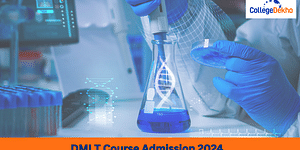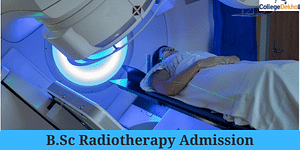DMLT Course - Diploma in Medical Laboratory Technology
DMLT course is a 2-year Diploma programme, that trains students to gain expertise in various diseases, their causes and symptoms. Aspirants successfully qualifying their 10+2 in the Science stream with Physics, Chemistry, Biology and English as core subjects are eligible to pursue a Diploma in Medical Laboratory Technology. After the course, aspirants can consider pursuing job profiles like Medical Laboratory Technician, Assistant Laboratory Technician, Laboratory Assistant, etc.
DMLT Course Overview
DMLT Course full form is a Diploma in Medical Laboratory Technology. It is a 2-year degree program, offered at several universities across the country. This course teaches students how to examine, evaluate, and identify various diseases through laboratory techniques and procedures. The DMLT admission process includes higher secondary qualifications with at least 50% marks in aggregate with science stream. Admission to DMLT Courses is mostly based on merit but some of the universities may also run their entrance tests. Some of the well-known institute-based entrance exams are the Manipal University Entrance Test, AISECT, Amity University Entrance Test, Jamia Hamdard Entrance Test, etc.
The DMLT course is offered both in full-time and part-time mode, and the curriculum includes attending seminars, lab sessions, and practical works along with theoretical study. However, theDMLT Course syllabusin all modes of learning remains the same. Subjects include Biochemistry, Pathology, Microbiology, Haematology etc. The DMLT Course fee ranges from INR 15,000 to INR 1.5 LPA. Some of the popular DMLT job profiles are Medical Lab Technician, Healthcare Assistant, Laboratory Manager, Lab Owner, Medical Technologist, Research Analyst etc. The averageDMLT course salarymay range from anywhere between INR 1.5 LPA and INR 7.5 LPA.
Students must complete their higher education in the science stream with Physics, Chemistry and Biology or Mathematics as major subjects. They should score at least 45%–50% in aggregate in class 12 examinations. Some universities may also conduct separate entrance tests where the admissions will depend on the overall test results. Average DMLT course fees in government colleges range from INR 15,000 to INR 1 LPA, and admission to these colleges usually depends on merit scored by the candidates in their 10+2 examinations.
On the other hand, the DMLT course fees in private colleges may differ from institute to institute, ranging from INR 40,000 to 1.5 LPA. After completing the diploma, one can expect a job as a Lab Technician in both government and private clinics or laboratories.
DMLT Course Latest Updates
- Application forms for some of the universities, like NIMS University, Rajasthan, are open and can be assessed through their official websites.
- Entrance exam for DMLT Course 2024 details can be assessed from the DMLT admissions 2024
- Applications to AIE CET 2025 are also open and available on DMLT Course admissions.
- Online applications for DMLT Course 2025 will be available from January 2025 onwards.
DMLT Course Highlights
Some of the major highlights of the DMLT course are given below:
| DMLT Course full form | Diploma in Medical Laboratory Technology |
|---|---|
| DMLT Course duration | 2 years |
| DMLT Course Entrance Examination | No specific entrance, but colleges like NIMS and a few government institutes conduct a CET for short-listing candidates. |
| Examination Type | Semester-System |
| DMLT Course Eligibility Criteria | Passed 10+2 with a minimum of 50% marks |
| DMLT Admission Process | Merit or entrance-based, depending upon the institute candidates have opted for. |
| DMLT Course Fees | INR 20,000- INR 1 LPA |
| Average Salary | INR 2 LPA - INR 4 LPA |
| Top Recruiting Fields | Government and Private Hospitals, Colleges and Universities, Pathology Labs, Medical Content Writing, Military Services, Blood banks, clinics, etc. |
FAQs
What is a DMLT course?
The DMLT course, or Diploma in Medical Laboratory Technology program, is a 2-year course that can be pursued after the successful completion of the 12th level of education. This medical course comprises advanced professional learning in the prevention, diagnosis, as well as treatment of diseases in patients via clinical laboratory tests.
Is it possible to pursue DMLT after completing BSc?
Yes, it is possible. Candidates can opt for the DMLT course right after graduation.
What is the duration of the DMLT course?
The course duration is 2 years.
Why Choose a DMLT Course?
To go through the benefits of DMLT course, interested candidates must check out the following important reasons for choosing a Diploma in Medical Laboratory Technology:
- DMLT Course as an exclusive stream in the field of medical sciences is currently considered one of the fastest-growing professions in health care globally.
- Additionally, choosing a DMLT course opens up a ton of job opportunities for students after completing the degree. They may choose the right job role for them by scrutinising the potential of the job profiles their abilities best match with.
- With the constant evolution of human health hazards and the ongoing demand for the advancement of medical technology, various relatively newer medical disciplines are gaining popularity. Scope in DMLT course is increasing as it is an important part of the healthcare industry. Therefore, choosing the DMLT course is always expected to set ample opportunities in the medical science industry.
- Several DMLT recruiters in India readily offer employment opportunities with good salary packages to DMLT graduates. These companies offer several DMLT jobs such as Lab technicians, MRI technicians, Laboratory managers, Senior lab technologists, etc.
- Since a Diploma in Medical Laboratory Technology is a part of Paramedical Sciences, the scope in this field is varied. For example, students can opt for opportunities across molecular diagnostics, molecular biotechnology firms, pathology laboratories, and research labs.
- Interestingly, the DMLT Course salary packages offered to students pursuing a DMLT course are competitive and decent paying.
- After graduating with a Diploma in Medical Laboratory Technology course, all students will be deemed eligible to assist doctors in taking samples, testing samples, and so on, under adequate supervision.
FAQs
What job roles are available after DMLT?
DMLT graduates can work as lab technicians, MRI technicians, laboratory managers, or senior technologists.
What is the salary after completing DMLT?
DMLT professionals often receive competitive salary packages, depending on the job role and location.
Why should I choose a DMLT course?
A DMLT course offers a fast-growing career in healthcare with varied job opportunities. It is an essential part of medical diagnostics, providing graduates with competitive salaries and a chance to assist in vital health testing procedures.
Types of DMLT Courses
To fulfill the rising demand for DMLT courses, several institutions all over the country have introduced DMLT courses both online and offline modes, as well as in full-time and part-time modes. Here we have given a brief about different types of DMLT courses for the convenience of the students:
| Type of DMLT Course | Average Course Fee | Duration |
|---|---|---|
| Part-Time DMLT Course | INR 30,000 to INR 65,000 | A part-time diploma in the DMLT degree course is mostly chosen by candidates who want to upskill their knowledge. The average duration of a part-time DMLT degree course is 1 to 2 years. Candidates can secure part-time DMLT courses in both online and offline modes. |
| Full-Time DMLT Course | INR 40,000 to INR 1 LPA | With the average course duration ranging from 2 years to 2.5 years, a full-time DMLT degree program is the most common and widely chosen course by the applicants. The entire course curriculum of the full-time degree course is conducted in offline mode. This involves regular practicals, lab work, and seminars. |
FAQs
What is the difference between full-time and part-time DMLT courses?
Full-time DMLT courses last 2–2.5 years, with hands-on lab work and regular classes. Part-time courses, lasting 1-2 years, are designed for working individuals, offering more flexible schedules in both online and offline modes.
What is the average fee structure for DMLT courses?
The average course fee for part-time DMLT courses ranges from INR 30,000 to INR 65,000, while full-time DMLT courses range from INR 40,000 to INR 1 lakh per annum.
Who should choose a part-time DMLT course?
A part-time DMLT course is ideal for working professionals looking to upskill or those who need a flexible schedule. It allows them to balance work with education, with options for both online and offline learning.
DMLT Course Specialisations
In the DMLT Course, you get a lot of different specialisation courses as given below, candidates can opt for the course that best suits their needs and interests. As previously mentioned, there are a lot of course options available, and the major DMLT course specialisation in India is listed below:
- Microbiology
- Clinical Biochemistry
- Molecular Biology and Applied Genetics
- Haematology
- Radiology
- Coagulation Biomedical Techniques
- Ultrasonography
- Clinical Chemistry
- Biostatistics
- Clinical Pathology
- Immunology and Immunological Techniques
- Electron Microscopy
- Parasitology
- Cytotechnology
- Bacteriology
FAQs
What are the popular specialisations in DMLT courses?
Popular DMLT specialisations include Microbiology, Clinical Biochemistry, Molecular Biology, Haematology, Radiology, and Immunology. These fields allow students to focus on specific areas of laboratory technology and diagnostics, providing in-depth knowledge and career growth opportunities.
Which DMLT specialisation focuses on disease-causing microorganisms?
Microbiology is a key DMLT specialisation that focuses on studying microorganisms like bacteria, viruses, and fungi that cause diseases. It involves testing and diagnosing infections, playing a vital role in clinical settings.
What is the role of Biostatistics in DMLT specialisation?
Biostatistics specialisation in DMLT involves applying statistical methods to analyse biological data, helping healthcare professionals interpret clinical research, laboratory results, and population health trends, ensuring more accurate diagnoses and effective treatments.
Difference between DMLT Course and BMLT Course
Listed below is a table comparing features of Diploma in Medical Laboratory Technology (DMLT) and Bachelor of Medical Laboratory Technology (BMLT) courses.
| Feature | DMLT Course | BMLT Course |
|---|---|---|
| Course Duration | 2 years | 4 years |
| Qualification | 10+2 or equivalent with science subjects | 10+2 or equivalent with science subjects |
| Course Content | Emphasis on hands-on laboratory experience and basic knowledge of medical laboratory technology | In-depth study of medical laboratory technology, including theory, practical applications, and advanced techniques |
| Career Opportunities | Medical laboratory technician, assistant laboratory technician, laboratory or healthcare assistant, etc. | Medical laboratory technologist, senior medical laboratory technologist, manager of a medical laboratory, etc. |
| Job Responsibilities | Performing routine laboratory tests, preparing samples, maintaining laboratory equipment, etc. | Performing complex laboratory tests, analysing results, interpreting data, supervising other laboratory personnel, etc. |
| Advancement Opportunities | Opportunities for advancement are limited, but technicians can improve their skills and knowledge through continuing education | You get the chance for higher job opportunities such as management positions, supervisory roles, and specialised positions in areas such as research or quality control |
To dive deeper into the topic, you can read further about the comparison between DMLT vs BMLT.
FAQs
What is the difference in course duration between DMLT and BMLT?
DMLT is a 2-year diploma course, while BMLT is a 4-year bachelor’s degree. DMLT focuses on basic medical lab technology, and BMLT covers more advanced and in-depth study.
How do the career opportunities differ between DMLT and BMLT graduates?
DMLT graduates typically qualify for roles like medical laboratory technicians and assistants. BMLT graduates can pursue advanced positions like senior technologists, lab managers, or supervisors.
Which course offers better advancement opportunities, DMLT or BMLT?
BMLT offers greater opportunities for career advancement, including management roles and specialised areas, while DMLT graduates have limited advancement but can improve skills through continuing education.
DMLT Course Eligibility Criteria
The DMLT course eligibility criteria in India are as follows:
| Particulars | Details |
|---|---|
| DMLT Course Qualification | The minimum educational requirement is a 10+2 or equivalent examination with Physics, Chemistry, and Biology as mandatory subjects. |
| Minimum Age | A student should at least be 17 years of age to pursue the DMLT course. |
| Required Marks | Students must have at least 45% to 50% in 10+2 or equivalent examination, depending on the institution. |
| Entrance Exam | Merit-based or entrance exams |
Skills Required for DMLT Course
Some of the key skills required for this course include:
FAQs
What technical skills are essential for a DMLT student?
A DMLT student must possess knowledge of lab equipment handling, sample collection, and diagnostic techniques. Understanding clinical procedures and laboratory safety protocols is crucial for effective performance in the medical laboratory field.
Are communication skills necessary for DMLT professionals?
Yes, effective communication is vital for DMLT professionals, as they often interact with patients and medical teams. Clear reporting of lab results and patient data ensures accurate diagnoses and efficient medical treatment.
How to get into the DMLT course?
You need to have at least 45% to 50% aggregate in 10th and 12th grade. Further, your admission will either be based on merit or you might have to sit for an entrance exam, depending on the institution.
DMLT Course Entrance Exams
There is no specific entry test for the Diploma in Medical Laboratory Technology. But few famous and top universities take the entrance exam. Some of the DMLT Course Entrance Exams are mentioned below:
| Common Entrance Test | Details |
|---|---|
| Manipal University Entrance Examination | The test consists of 240 multiple-choice questions; Students need to answer 60 objective questions; the Exam is conducted in computer-based mode; the Medium for the test is English; MET is conducted once every year; the duration of the test is 120 minutes. The question paper is divided into four sections, namely physics, chemistry, biology/mathematics, and English. 4 marks are awarded for every correct response and 1 mark is deducted for every wrong response. |
| Amity University Entrance Examination | The duration of the exam is 120 minutes. There are four sections: Physics, Chemistry, Biology/ Mathematics, and English. A total of 90 multiple-choice questions are asked of the students. The test is conducted in online mode. 4 marks are awarded for the correct answer, and 1 is deducted for the incorrect answer. The test is conducted once annually. |
| AISECT University Entrance Examination | It is conducted on a national level. The duration of the test is 120 minutes. Students have to sit for this exam in offline mode. Conducted once every year, usually in August; A total of 100 multiple-choice questions are asked to the students. |
| JIPMER | Conducted online mode; The syllabus includes physics, chemistry and biology/math; A total of 200 multiple-choice questions are asked to the students; the Total marks of the exam are 800. The exam is conducted in two shifts: morning and afternoon; the duration of the exam is 2 hours and 30 minutes; There is a scheme of negative marking. |
FAQs
Are entrance exams mandatory for DMLT courses?
No, most institutions don’t require a specific DMLT entrance exam, but top universities like Manipal, Amity, and JIPMER conduct entrance tests to assess candidates based on subjects like Physics, Chemistry, Biology/Math, and English.
What is the format of the Manipal University Entrance Exam for DMLT?
The exam includes 240 multiple-choice questions on Physics, Chemistry, Biology/Mathematics, and English. It’s computer-based, conducted annually, and follows a negative marking scheme, with 4 marks for correct answers and 1 mark deducted for wrong responses.
Which universities conduct DMLT entrance exams?
Universities like Manipal, Amity, AISECT, and JIPMER conduct entrance exams for DMLT courses. These exams assess knowledge in core subjects like Physics, Chemistry, Biology/Mathematics, and English, with a mix of online and offline formats.
DMLT Course Admission Process
Even though some colleges conduct their entrance exams for the selections, the DMLT Course admission process mainly follows a straightforward direct selection process based on merit. If the students want to get DMLT course admission through these individual colleges, they must check their respective official websites frequently to get updates on the latest information. Listed below are the steps on how to apply for the DMLT admission process:
- The DMLT Course qualification is mainly based on the marks obtained by the candidates in their 10+2 level and on a merit list provided by respective authorities. However, admissions in some colleges, like St. John’s University and Aligarh Muslim University, are based on the marks scored in their respective entrance exams.
- The candidates are required to fill out the DMLT application form and provide all the required important documents. They have the option to submit the required documents directly to the college or through online mode.
- For the online process, the students are required to visit the institute’s official website and register for the entrance exam. A registration fee is charged at this step, on completion of which you will be guided further to provide the personal information and required documents.
- If the candidates wish to submit the application form in offline mode, they can visit the college campus and complete the formalities by visiting the Admission Department to provide all the required documents.
- All students are required to have scored at least 45-50 percent aggregate in their 10+2, and they must have PCM/PCB as mandatory subjects to be eligible for the DMLT course.
- After qualifying for the entrance exam, the candidates are required to apply for the counselling session, during which they will be assigned to the desired colleges.
- Interested candidates can look up DMLT Course Admission 2024 in India to get detailed information about the admission procedure.
FAQs
How is DMLT course admission typically conducted?
Admission is mostly merit-based, considering 10+2 marks in PCM/PCB. However, certain colleges like St. John’s and AMU require entrance exams for selection. Regularly checking official websites for updates is essential.
Can I apply for DMLT admission online and offline?
Yes, DMLT course applications can be submitted online via the institute’s website or offline by visiting the college campus. The process involves filling out forms, submitting required documents, and paying a registration fee.
What is the minimum eligibility for DMLT admissions?
Candidates must have scored 45-50% in 10+2 with Physics, Chemistry, and Biology/Mathematics as mandatory subjects. Admission may depend on merit or performance in an entrance exam, depending on the institution.
DMLT Course Syllabus
DMLT course focuses on the practical application of theoretical knowledge. Seminars, practical applications in labs, classroom lectures, and even internships are offered to students to learn about the nature of practicality that this subject requires. The list below provides a semester-wise breakdown of the subjects that will be covered in this course. You can also get the latest syllabus details on the DMLT syllabus 2024.
| DMLT Course Syllabus Semester Wise | |||
|---|---|---|---|
| First Semester | Second Semester | Third Semester | Fourth Semester |
| Anatomy of a Human | Physiology of Man | Human Physiology II | Techniques of Histopathology |
| Clinical Biochemistry Fundamentals | Biochemistry Fundamentals | Technical and Metabolic Biochemistry | Pathology Laboratory |
| Human Science Fundamentals | Technology of Information and Communication | Microbiology (Technical) | Microbiology in Clinical Practice |
| Communication in English | Community Improvement | Activities for Community Development II | Pathology in Clinical Practice |
FAQs
What is the focus of the DMLT course syllabus?
The DMLT syllabus emphasises practical applications alongside theoretical knowledge. Students engage in lab work, seminars, internships, and lectures, ensuring a well-rounded education in medical laboratory technology for better career readiness.
How is the DMLT syllabus structured?
The DMLT course is divided into four semesters covering subjects like Anatomy, Human Physiology, Clinical Biochemistry, Microbiology, and Histopathology techniques. Each semester introduces both foundational and advanced topics related to medical laboratory technology.
What practical skills are taught in DMLT courses?
DMLT students learn techniques in clinical biochemistry, histopathology, microbiology, and pathology laboratories, preparing them for hands-on roles in medical labs. They also focus on communication and community development for well-rounded professional growth.
Top DMLT Course Colleges in India
Mentioned below are the top DMLT government and private colleges in India, along with their NIRF rankings and course fees:
Top Government Colleges Offering DMLT Courses in India
| DMLT Government Colleges | DMLT Course Fee (Average) |
|---|---|
| IIT Patna | INR 80,000 |
| Delhi Pharmaceutical Sciences and Research University | INR 20,000 |
| IPGMER | INR 30,000 |
| Banaras Hindu University | INR 30,000 |
| Seth GS Medical College | INR 1.2 LPA |
| KP Paramedical Institute | INR 21,000 |
| All India Institute of Medical Sciences, Delhi | INR 98,000 |
| King George Medical University, Lucknow | INR 48,000 |
| Vardhman Mahavir Medical College And Safdarjung Hospital, Delhi | INR 2,00,000 |
| SCB Medical College and Hospital, Cuttack | INR 1,00,000 |
Top Private Colleges Offering DMLT Courses in India
| DMLT Private Colleges | DMLT Course Fee (Average) |
|---|---|
| Rama University | INR 1.5 LPA |
| Shri Sai College of Nursing and Paramedical Science | INR 80,000 |
| Corporate Group of Institutions | INR 2 LPA |
| Apex University | INR 55,000 |
| Swami Devi Dyal Group of Professional Institutions | INR 1.31 LPA |
| Institute of Public Health and Hygiene | INR 1.04 LPA |
| Career College, Bhopal | INR 86,000 |
| Seacom Skills University, West Bengal | INR 1.4 LPA |
| Dr. Preeti Global University, Indore | INR 80,000 |
| Chirayu University, Bhopal | INR 79,000 |
FAQs
Which are the top colleges for DMLT in India?
Leading DMLT colleges include Delhi Pharmaceutical Sciences and Research University, IIT Patna, and Banaras Hindu University, with options in both government and private institutions.
What is the fee range for DMLT courses in India?
DMLT course fees range from INR 20,000 at Delhi Pharmaceutical Sciences to INR 2 LPA at Corporate Group of Institutions.
Are NIRF rankings available for all DMLT colleges?
Not all DMLT colleges have NIRF rankings; only a few, like IIT Patna (34) and Banaras Hindu University (7), are ranked.
Scope in DMLT Course in India- Career Options, Salary, Top Recruiters
The scope in DMLT Course can be widened if the candidates pursue some of the undergraduate and certification courses listed below, after completing their Diploma in Medical Laboratory and Technology.
| UG Courses | Certificate Courses |
|---|---|
| Medical Lab Technology | Anaesthesia Technician |
| Medical Laboratory Technology | Blood Bank Technician |
| Medical Imaging Technology | Dark Room Assistant |
| Clinical Laboratory Technology | Radiography & Imaging Technique |
DMLT Course Career Options and Job Prospects
The students who have completed the DMLT Course are eligible to apply for jobs and/or internships in their selected career profile. Following completion of the Diploma in Medical Lab and Technology, the candidate can follow some of the undergraduate and certificate courses listed below (DMLT). Here are the best-recruiting businesses for students in the private and public sectors, among many others.
| DMLT Areas of Employment | Job Profile |
|---|---|
| Pathology Labs | Lab consultants |
| Government and private hospitals | Research Analysts |
| Blood Banks | Technologists |
| Clinics | Lab Technician |
| Academic Writing | Medical Writers for journals or websites |
Salary After DMLT
The table below shows the average monthly pay offered for various job roles performed by MLT applicants.
| Job Profiles | Salaries (Monthly) |
|---|---|
| Laboratory | INR 16,248 |
| Research Technician | INR 21,956 |
| Research Assistant | INR 22,792 |
| Medical Technologist | INR 17,407 |
| Laboratory Analyst | INR 17,337 |
| Technologist | INR 21,278 |
Top Recruiters for DMLT
All the hospitals, clinics, and laboratories in the country need DMLT graduates to carry out and analyse blood, fluid, and tissue samples. These recruiters seek people with in-depth expertise in medical laboratory technology and provide DMLT graduates with high-paying DMLT jobs. Therefore, you can find the list of top DMLT job recruiters mentioned below:
- Dr. LalPathLabs
- SRL Diagnostics
- Bio Rad Laboratories
- Apollo Health and Lifestyle
- House of Diagnostics
- Maxim Healthcare
- Reliance Industries
- Cipla
- Dr. Reddy’s
- Sun Pharmaceuticals
- Fortis Hospitals and Labs
- Sri Gangaram Hospitals
- Medanta
- Ranbaxy
FAQs
What career options are available after a DMLT course?
DMLT graduates can work in pathology labs, hospitals, clinics, blood banks, or academic writing as lab technicians, research analysts, medical writers, and technologists.
What is the average monthly salary after DMLT?
Salaries range from INR 16,248 for laboratory roles to INR 22,792 for research assistant positions, depending on job profile and experience.
Who are the top recruiters for DMLT graduates in India?
Leading recruiters include Dr. LalPathLabs, SRL Diagnostics, Apollo Health, Cipla, Fortis Hospitals, Medanta, and Sun Pharmaceuticals.
Courses to Pursue after DMLT Course
After completing a Diploma in Medical Laboratory Technology, you can pursue higher education in the same discipline. The courses to choose after your diploma in MLT are given below.
| Course Name | Average Duration | Average Course Fee Range |
|---|---|---|
| BSc in Medical Laboratory Technology | 3 years to 3.5 years | INR 25,000 to INR 50,000 |
| BSc in Medical Imaging Technology | 3 years to 4 years | INR 37,000 to INR 80,000 |
| BSc in Clinical Laboratory Technology | 3 years to 3,5 years | INR 27,000 to INR 75,000 |
| Bachelor of Medical Lab Technology (BMLT) | 3 years to 3.5 years | INR 30,000 to INR 85,000 |
| Certificate Course in Anaesthesia Technician | 3 months to 6 months | INR 10,000 to INR 17,000 |
| Certificate Course in Dark Room Assistant | 3 months to 7 months | INR 12,000 to INR 15,000 |
| Certificate Course in Training of Laboratory Assistants | 6 months to 1 year | INR 17,000 to INR 25,000 |
| Certificate Course in Medical Record Technology | 6 months to 1 year | INR 5,000 to INR 12,000 |
| Certificate Course in Blood Bank Technician | 3 months to 6 months | INR 13,500 to INR 17,000 |
| Certificate Course in Radiography and Imaging Technique | 6 months to 1 year | INR 20,000 to INR 25,000 |
| Certificate Course in Cath Lab Technician | 6 months to 1 year | INR 7,000 to INR 15,000 |
| Certificate Course in Clinical Diagnostic Techniques | 6 months to 1 year | INR 15,000 to INR 20,000 |
FAQs
What can I pursue after completing a DMLT course?
After DMLT, you can pursue higher studies such as a BSc in Medical Laboratory Technology or various certificate courses in specialised medical fields.
What is the duration of these advanced courses?
Courses range from 3 months to 4 years, depending on whether you choose a degree or certificate program.
What is the fee range for these courses?
The fee varies widely, from INR 5,000 to INR 85,000, depending on the course type and duration.
Table of Contents
- DMLT Course Overview
- DMLT Course Latest Updates
- DMLT Course Highlights
- Why Choose a DMLT Course?
- Types of DMLT Courses
- DMLT Course Specialisations
- Difference between DMLT Course and BMLT Course
- DMLT Course Eligibility Criteria
- DMLT Course Entrance Exams
- DMLT Course Admission Process
- DMLT Course Syllabus
- Top DMLT Course Colleges in India
- Scope in DMLT Course in India- Career Options, Salary, Top Recruiters
- Courses to Pursue after DMLT Course
- FAQs about DMLT Course
FAQs about DMLT Course
Do I need to appear for NEET to be admitted in the DMLT course?
No, NEET is not necessary for DMLT course admissions in India.
I didn’t take Biology in classes 11 and 12th, can I be admitted to the DMLT course?
Students who have studied 10+2 education with Physics, Biology, and Chemistry are eligible for the DMLT course. One has to opt for these subjects mandatorily in 10+2 studies.
Can I take the DMLT course while also taking PCM?
The DMLT course is tied to medical diagnosis. Such courses require a solid understanding of biology. In general, 10+2 is the minimum need for DMLT, with Physics, Chemistry, and Biology as required subjects. Though some colleges also offer the subject with PCM.
Can I become a medical officer after finishing DMLT?
An undergraduate degree is required to work as a medical officer.
Can I pursue MLT or MSc after completing DMLT?
Undergraduate students are eligible to enter MLT, MSc. Following a diploma, you cannot pursue a Masters degree. To be eligible for MLT or MSc, you must have completed an undergraduate course, such as BMLT, BSc, or equivalent.
Related Questions
Popular Courses
- Courses
- Diploma in Medical Laboratory Technology










